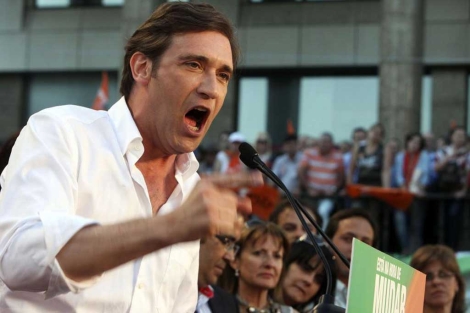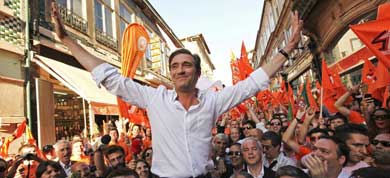All polls give victory to the conservative Pedro Passos Coelho, with more than 35% of voting intentions, so that the Social Democrat leader on Sunday could become the next prime minister of Portugal. Still, the socialist José Socrates, even though Luso chief executive office, does not throw the towel last night in one of the latest campaign actions called the "vote" to voters that his party left to recover lost support over the past few months.
Polls give about 31% of voting intentions, while in 2009 won with 36% and in 2005 won an absolute majority. Although it seems clear victory for the Social Democrats, until now the main opposition party, everything is still open in Portugal. Therefore, Passos Coelho emphasizes the mobilization of the undecided and those who do not intend to vote, to try to reach the absolute majority rule would allow quietly, and requires the President Anibal Cavaco Silva, to ensure parliamentary stability and prevent the recurrence of recent events that led to the resignation of José Sócrates.
However, aware that it will be very difficult to achieve, the Social Democrats opened the door to the ultra-conservative Christian Democrats (CDS / PP), led by former Defense Minister of the Government of Jose Manuel Durao Barroso, Paulo Portas. This, which recorded a rise in the polls above 12%, has not yet said whether he will be limited to give parliamentary support to the hypothetical social democratic government or agree to participate in the coalition of right.
José Sócrates burning the last rounds to fight against this possibility in Braga last night saying that the union of the two conservative parties "endangers the welfare state" in which he both has been debated. So, besides trying to convince voters that socialism is still the only one capable of maintaining the conclusion of the country, "Socrates also calls for the vote of the Social Democrats saying that this party is now" much more liberal "and not based on the pillars of social democracy when it was created.
Both the Socialists and Social Democrats closed the campaign in Lisbon. While the former have chosen EXPO98 area as a symbol of "modernity of the country", the Conservatives have chosen to close with a rally at the Largo do Carmo, a symbol of the Revolution of the Carnations on April 74, brought democracy to Portugal. 


Polls give about 31% of voting intentions, while in 2009 won with 36% and in 2005 won an absolute majority. Although it seems clear victory for the Social Democrats, until now the main opposition party, everything is still open in Portugal. Therefore, Passos Coelho emphasizes the mobilization of the undecided and those who do not intend to vote, to try to reach the absolute majority rule would allow quietly, and requires the President Anibal Cavaco Silva, to ensure parliamentary stability and prevent the recurrence of recent events that led to the resignation of José Sócrates.
However, aware that it will be very difficult to achieve, the Social Democrats opened the door to the ultra-conservative Christian Democrats (CDS / PP), led by former Defense Minister of the Government of Jose Manuel Durao Barroso, Paulo Portas. This, which recorded a rise in the polls above 12%, has not yet said whether he will be limited to give parliamentary support to the hypothetical social democratic government or agree to participate in the coalition of right.
José Sócrates burning the last rounds to fight against this possibility in Braga last night saying that the union of the two conservative parties "endangers the welfare state" in which he both has been debated. So, besides trying to convince voters that socialism is still the only one capable of maintaining the conclusion of the country, "Socrates also calls for the vote of the Social Democrats saying that this party is now" much more liberal "and not based on the pillars of social democracy when it was created.
Both the Socialists and Social Democrats closed the campaign in Lisbon. While the former have chosen EXPO98 area as a symbol of "modernity of the country", the Conservatives have chosen to close with a rally at the Largo do Carmo, a symbol of the Revolution of the Carnations on April 74, brought democracy to Portugal.



No comments:
Post a Comment